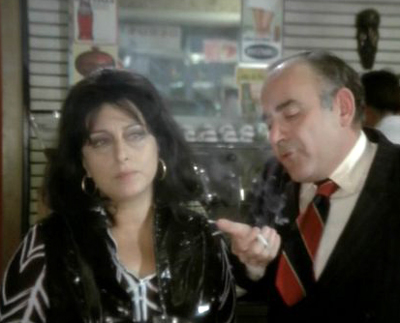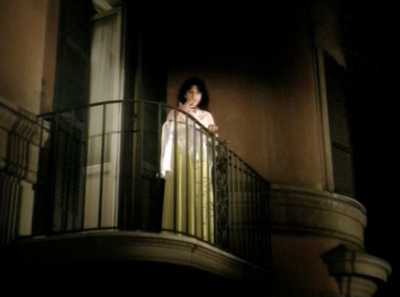
 |
|
|
|
The most revered and respected Italian film actress of her day, Anna Magnani died of an unexpected malady not long after she turned sixty. One of the last filmmakers she worked with was Alfredo Giannetti, who first came to prominence scripting for the great director Pietro Germi (The Railroad Man). Giannetti was later awarded an Oscar for his screenplay for Divorce Italian Style. In 1971 he received a commission to write and direct an Italian TV miniseries called Three Women (Tre Donne) starring Ms. Magnani in three separate roles. La sciantosa is about a singer in WW1. Un incontro gives Ms. Magnani a role similar to her career breakthrough in Roberto Rossellini's core neorealist classic Roma Città aperta. The idea was to allow Magnani to paint an in-depth portrait of Italian womanhood across time. 
Set in the present day, the third TV movie L'automobile (The Automobile) is the curious story of a retired prostitute who gets the notion to change her life by buying a car. Giannetti quietly uses this premise to suggest a broader statement about modern life in Italy. The film at first seems somewhat shapeless. Anna (Anna Magnani) spends her evenings in the Via Veneto cafés, where friendly waiters and bartenders greet her as "La Contessa". Anna has saved her money and lives comfortably, but we can tell that she's lonely. She seems to have no family and no children, and her only friend is Giggetto "Gigi" (Vittorio Caprioli), a neurotic chiseler always cadging smokes and claiming to be broke. Gigi balks at letting Anna buy him a dinner until she promises to fill his car with gasoline. Gigi reluctantly gives her driving lessons, but she passes her test only when the instructor (Pupo De Luca) turns out to be an old client. Almost immediately she becomes the proud owner of a sporty convertible roadster in her favorite color, yellow. When Anna feels up to the task, she cautiously drives her new possession to the beach. At the hotel's pool her attention soon fixates on a handsome young diver (Christian Hay). He and his friend need a ride back to Rome... A somewhat disturbing light drama, L'automobile has little good to say about changing times in Italy. Anna was forced to go independent when the government closed the brothels ten years before, yet managed to prosper. She's found respectability in retirement but the only world she knows and understands operates at the personal, neighborhood level. The tempo of the times has changed. Cars are now everywhere, jamming an infrastructure never meant to accommodate high levels of traffic. The road to the beach is clogged with thousands of short-tempered motorists, an image not that far removed from the mordant satire of Jean-Luc Godard's Weekend. In place of a new life of freedom and independence, the newly affluent Italians have succeeded only in isolating themselves one from another. Anna's new car can take her to new places, but wherever she goes she's a stranger. 
The burden of car ownership also changes Anna's value system. She surrenders more freedom than she gains. The major purchase comes with rules, obligations, security issues, insurance liabilities, etc. She misses sleep worrying that her 'baby' might be stolen or vandalized. Without resorting to speechmaking, Alfredo Giannetti's makes a more persuasive social statement than do many openly political films by committed leftist directors. The downbeat ending communicates well the trap of our increasingly materialistic culture, where people strive to acquire consumer goods in the search for a positive self-image. Although she's careful about her driving inexperience, Anna's new illusion of freedom causes her to let down her guard with the wrong young man, a hothead who expresses his universal contempt by mistreating her beloved new car. As was her special talent, Ms. Magnani's acting seems more like natural behavior than a performance. Anna talks to herself incessantly. Although anxious about passing her license test, she never strikes us as a comedic character. Likewise Vito Caprioli does not exaggerate the comical Gigi. If anything, Gigi illustrates the vacuum in Anna's life. She must be in great need of a close confidante if she'll endure this intolerably selfish, annoying fellow. Christian Hay's Lou represents the emerging "new Italian", the alienated next generation. Even with her background, our heroine is unaccustomed to receiving such callous treatment at the hands of a man. Lou is already bullying Anna even before he makes her a literal prisoner in her own car. To him she's just another woman he can abuse and discard. 
Rarovideo's DVD of L'automobile is a good transfer of a television production filmed in the 4x3 flat ratio. Colors are satisfactory. The cinematographer is the talented Pasqualino De Santis, of Zeffirelli's Romeo and Juliet, Visconti's Death in Venice and Rosi's Carmen. An added treat is the music by the maestro Ennio Morricone. The show opens with several pop songs played by a nightclub band, and then settles into a moody background underscore. Rarovideo commissioned new English subtitles for the Italian-only presentation. Film critic Mario Sesti provides a taped introduction, and an original trailer is present. In the place of liner notes printed on paper, a DVD-ROM file contains a bio and filmography for Anna Magnani, as well an illustrated essay by Bruno Di Marino and an affectionate remembrance for the actress known as "Nannarella" by Patrizia Pistagnesi. Some sample quotes from the beloved star are also included: "In Italy there is a strange system: when a film is no good the actress is to blame. They also forget that I am not an actress by profession, that I can only get something done when I'm free to do what I want like a writer when he writes or a painter when he paints, that I cannot be a slave to technique, I must be inventive. Besides I am fed up with those eternal roles of hysterical and noisy lower class women."
On a scale of Excellent, Good, Fair, and Poor,
L'automobile rates:
Reviews on the Savant main site have additional credits information and are often updated and annotated with reader input and graphics. Also, don't forget the 2011 Savant Wish List. T'was Ever Thus.
Review Staff | About DVD Talk | Newsletter Subscribe | Join DVD Talk Forum |
| ||||||||||||||||||